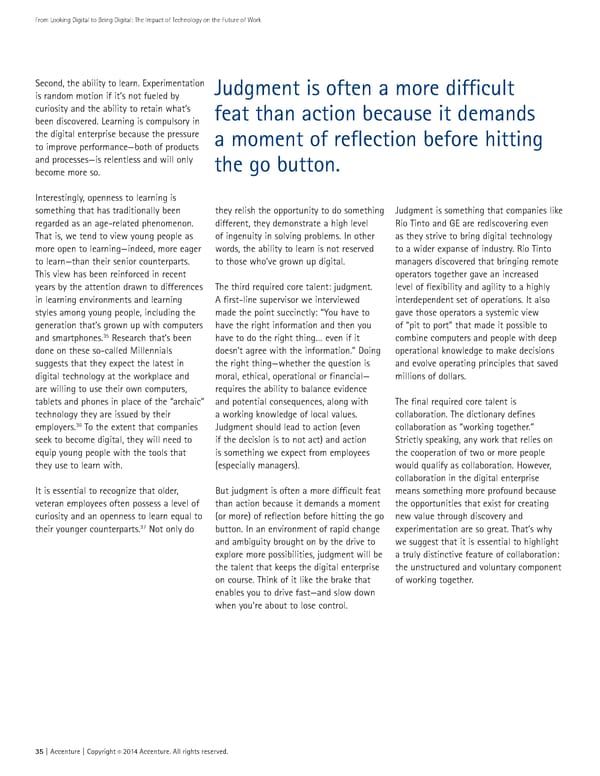From Looking Digital to Being Digital: The Impact of Technology on the Future of Work Second, the ability to learn. Experimentation Judgment is often a more difficult is random motion if it’s not fueled by curiosity and the ability to retain what’s feat than action because it demands been discovered. Learning is compulsory in the digital enterprise because the pressure a moment of reflection before hitting to improve performance—both of products and processes—is relentless and will only the go button. become more so. Interestingly, openness to learning is something that has traditionally been they relish the opportunity to do something Judgment is something that companies like regarded as an age-related phenomenon. different, they demonstrate a high level Rio Tinto and GE are rediscovering even That is, we tend to view young people as of ingenuity in solving problems. In other as they strive to bring digital technology more open to learning—indeed, more eager words, the ability to learn is not reserved to a wider expanse of industry. Rio Tinto to learn—than their senior counterparts. to those who’ve grown up digital. managers discovered that bringing remote This view has been reinforced in recent operators together gave an increased years by the attention drawn to differences The third required core talent: judgment. level of flexibility and agility to a highly in learning environments and learning A first-line supervisor we interviewed interdependent set of operations. It also styles among young people, including the made the point succinctly: “You have to gave those operators a systemic view generation that’s grown up with computers have the right information and then you of “pit to port” that made it possible to 35 and smartphones. Research that’s been have to do the right thing… even if it combine computers and people with deep done on these so-called Millennials doesn’t agree with the information.” Doing operational knowledge to make decisions suggests that they expect the latest in the right thing—whether the question is and evolve operating principles that saved digital technology at the workplace and moral, ethical, operational or financial— millions of dollars. are willing to use their own computers, requires the ability to balance evidence tablets and phones in place of the “archaic” and potential consequences, along with The final required core talent is technology they are issued by their a working knowledge of local values. collaboration. The dictionary defines employers.36 To the extent that companies Judgment should lead to action (even collaboration as “working together.” seek to become digital, they will need to if the decision is to not act) and action Strictly speaking, any work that relies on equip young people with the tools that is something we expect from employees the cooperation of two or more people they use to learn with. (especially managers). would qualify as collaboration. However, collaboration in the digital enterprise It is essential to recognize that older, But judgment is often a more difficult feat means something more profound because veteran employees often possess a level of than action because it demands a moment the opportunities that exist for creating curiosity and an openness to learn equal to (or more) of reflection before hitting the go new value through discovery and 37 their younger counterparts. Not only do button. In an environment of rapid change experimentation are so great. That’s why and ambiguity brought on by the drive to we suggest that it is essential to highlight explore more possibilities, judgment will be a truly distinctive feature of collaboration: the talent that keeps the digital enterprise the unstructured and voluntary component on course. Think of it like the brake that of working together. enables you to drive fast—and slow down when you’re about to lose control. 35 | Accenture | Copyright 2014 Accenture. All rights reserved. ©
 From Looking Digital to Being Digital Page 33 Page 35
From Looking Digital to Being Digital Page 33 Page 35